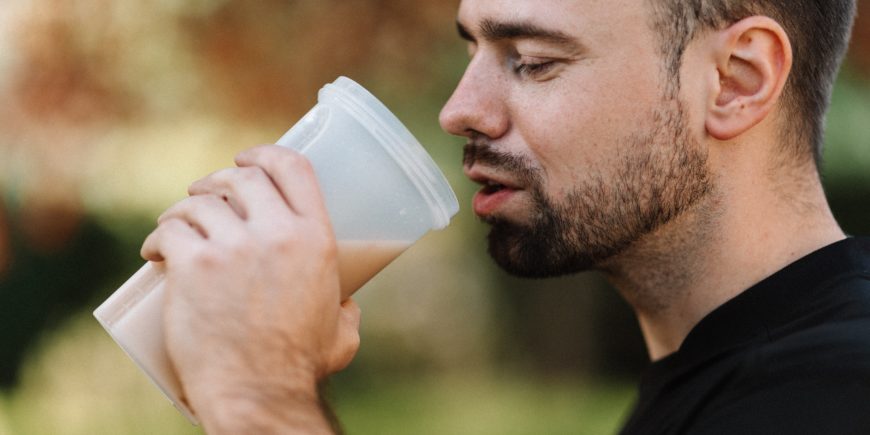Protein is a crucial nutrient for muscle building and repair. If you’re looking to optimize your muscle growth, it’s important to understand how much protein you need, how often to consume it, and how to take advantage of the anabolic window. In this article, we will delve into the topic of protein requirements for muscle building, discuss the frequency of protein consumption, explain the concept of the anabolic window, and provide practical strategies to make the most of it.
I. Determining Protein Requirements for Muscle Building
- General Protein Guidelines:
- The recommended protein intake for individuals engaged in resistance training is typically between 0.7 to 1 gram of protein per pound of body weight (1.6 to 2.2 grams per kilogram).
- This range provides an adequate supply of amino acids, the building blocks of protein, to support muscle protein synthesis and facilitate muscle growth.
- Individual Factors:
- Protein requirements may vary depending on individual factors such as age, sex, body composition, training intensity, and goals.
- Athletes or those engaging in intense training may require higher protein intakes within the recommended range.
- Protein Quality:
- High-quality protein sources, including lean meats, poultry, fish, eggs, dairy products, and plant-based sources like legumes and tofu, are ideal for muscle building due to their amino acid composition.
II. Frequency of Protein Consumption
- Total Daily Protein Intake:
- Meeting your total protein requirements spread throughout the day is more important than focusing solely on the frequency of meals.
- Aim for three to six protein-rich meals or snacks evenly spaced throughout the day to support muscle protein synthesis.
- Protein Timing:
- The anabolic window refers to the period after exercise when the body is particularly receptive to nutrient intake for muscle repair and growth.
- Consuming protein-rich meals or supplements within approximately 1 to 2 hours after a workout is commonly suggested to maximize the benefits of the anabolic window.
- Pre- and Post-Workout Nutrition:
- Consuming a protein-rich meal or snack before a workout helps supply amino acids for muscle protein synthesis during exercise.
- Post-workout nutrition, particularly with a combination of protein and carbohydrates, aids in muscle recovery, glycogen replenishment, and overall muscle growth.
III. Leveraging the Anabolic Window for Muscle Growth
- Protein Sources:
- Fast-digesting protein sources, such as whey protein, are often recommended immediately after a workout to provide a quick supply of amino acids for muscle repair.
- Slow-digesting protein sources, like casein protein or whole foods, can be consumed before bedtime to support overnight muscle protein synthesis.
- Essential Amino Acids (EAAs) and Leucine:
- Essential amino acids, including leucine, play a critical role in stimulating muscle protein synthesis.
- Consuming protein sources rich in leucine, such as whey protein or animal-based proteins, can be advantageous for maximizing muscle growth.
- Individual Timing and Preferences:
- While the anabolic window provides an opportunity to optimize muscle protein synthesis, it’s essential to consider individual timing and preferences.
- Some individuals may find it more suitable to consume a protein-rich meal or snack immediately after a workout, while others may prefer a slightly delayed intake.
- Overall Protein Distribution:
- It is crucial to emphasize overall protein distribution throughout the day rather than solely relying on the anabolic window.
- Prioritize evenly distributed protein-rich meals or snacks across the day to ensure a continuous supply of amino acids for muscle building and repair.
Meeting your protein requirements is vital for building muscle. Aim for 0.7 to 1 gram of protein per pound of body weight from high-quality sources. While the anabolic window presents an opportunity for optimized muscle protein synthesis, it’s important to focus on total daily protein intake and evenly distribute protein-rich meals or snacks throughout the day. By consuming protein before and after workouts, prioritizing essential amino acids like leucine, and tailoring timing to individual preferences, you can make the most of the anabolic window and support your muscle growth goals. Always consult with a healthcare professional or registered dietitian for personalized advice based on your specific needs and circumstances.
Want to build some muscle? Alpha Expat can help you reach your fitness and nutrition goals with bespoke solutions. Reach out to us and get to ball rolling or click on the WhatsApp button in the lower right corner.




One thought on “How Much Protein Do I Need to Build Muscle?”